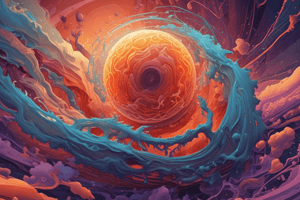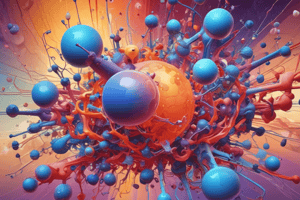Podcast
Questions and Answers
What is the primary difference between a compound and a mixture?
What is the primary difference between a compound and a mixture?
- A compound is a substance that cannot be broken down into simpler substances, while a mixture is a substance that can be broken down into simpler substances.
- A compound is made up of two or more elements, while a mixture is made up of two or more compounds.
- A compound is a substance formed by combining two or more elements, while a mixture is a blend of two or more substances that are not chemically combined. (correct)
- A compound is a blend of two or more substances that are not chemically combined, while a mixture is a substance formed by combining two or more elements.
What is the state of matter in which particles are closely packed and have a fixed shape and volume?
What is the state of matter in which particles are closely packed and have a fixed shape and volume?
- Solid (correct)
- Plasma
- Liquid
- Gas
What is an example of a physical property of matter?
What is an example of a physical property of matter?
- Flammability
- Ability to conduct heat or electricity
- Reactivity with other substances
- Color (correct)
What is an example of a chemical change?
What is an example of a chemical change?
What is the term for a substance that cannot be broken down into simpler substances?
What is the term for a substance that cannot be broken down into simpler substances?
What is an example of a mixture in our surroundings?
What is an example of a mixture in our surroundings?
What is the state of matter in which particles are widely spaced and can move freely, expanding to fill their container?
What is the state of matter in which particles are widely spaced and can move freely, expanding to fill their container?
What is the term for a change in which the substance remains the same but its physical properties change?
What is the term for a change in which the substance remains the same but its physical properties change?
What is the primary characteristic that defines matter?
What is the primary characteristic that defines matter?
Which of the following is an example of a substance that is composed of matter in our daily lives?
Which of the following is an example of a substance that is composed of matter in our daily lives?
What is the term for the state of matter in which particles are highly energetic and have neither a fixed shape nor volume?
What is the term for the state of matter in which particles are highly energetic and have neither a fixed shape nor volume?
Which of the following is a characteristic of a physical property of matter?
Which of the following is a characteristic of a physical property of matter?
What is the term for a substance that is formed by combining two or more different elements?
What is the term for a substance that is formed by combining two or more different elements?
Which of the following is an example of a material that is composed of matter in our daily lives?
Which of the following is an example of a material that is composed of matter in our daily lives?
Study Notes
Matter in Our Surroundings
Composition of Matter
- Matter is composed of:
- Elements: substances that cannot be broken down into simpler substances (e.g., hydrogen, oxygen)
- Compounds: substances formed by combining two or more elements (e.g., water, salt)
- Mixtures: blends of two or more substances that are not chemically combined (e.g., air, soil)
States of Matter
- Matter can exist in three main states:
- Solid: particles are closely packed and have a fixed shape and volume (e.g., rocks, metals)
- Liquid: particles are close together but can move freely, taking the shape of their container (e.g., water, oil)
- Gas: particles are widely spaced and can move freely, expanding to fill their container (e.g., air, helium)
Properties of Matter
- Physical properties:
- Color
- Texture
- Odor
- Melting and boiling points
- Density
- Chemical properties:
- Reactivity with other substances
- Flammability
- Ability to conduct heat or electricity
Changes in Matter
- Physical change: a change in which the substance remains the same but its physical properties change (e.g., melting, freezing, dissolving)
- Chemical change: a change in which the substance is transformed into a new substance (e.g., combustion, rusting)
Examples of Matter in Our Surroundings
- Air: a mixture of gases, primarily nitrogen and oxygen
- Water: a compound made up of hydrogen and oxygen
- Soil: a mixture of mineral particles, organic matter, and other substances
- Food: a mixture of carbohydrates, proteins, fats, and other nutrients
- Building materials: mixtures of elements and compounds, such as wood, concrete, and steel
Composition of Matter
- Elements are substances that cannot be broken down into simpler substances, examples being hydrogen and oxygen.
- Compounds are substances formed by combining two or more elements, such as water and salt.
- Mixtures are blends of two or more substances that are not chemically combined, examples being air and soil.
States of Matter
- Solids have particles that are closely packed and have a fixed shape and volume, examples being rocks and metals.
- Liquids have particles that are close together but can move freely, taking the shape of their container, examples being water and oil.
- Gases have particles that are widely spaced and can move freely, expanding to fill their container, examples being air and helium.
Properties of Matter
- Physical properties of matter include color, texture, odor, melting and boiling points, and density.
- Chemical properties of matter include reactivity with other substances, flammability, and ability to conduct heat or electricity.
Changes in Matter
- Physical changes occur when the substance remains the same but its physical properties change, examples being melting, freezing, and dissolving.
- Chemical changes occur when the substance is transformed into a new substance, examples being combustion and rusting.
Examples of Matter in Our Surroundings
- Air is a mixture of gases, primarily composed of nitrogen and oxygen.
- Water is a compound made up of hydrogen and oxygen.
- Soil is a mixture of mineral particles, organic matter, and other substances.
- Food is a mixture of carbohydrates, proteins, fats, and other nutrients.
- Building materials are mixtures of elements and compounds, such as wood, concrete, and steel.
Definition of Matter
- Anything that has mass and occupies space is considered matter.
- Matter is the physical substance that makes up all objects, living and non-living.
States of Matter
- Solid: rigid, retains its shape, e.g., rocks, metals.
- Liquid: takes the shape of its container, e.g., water, oil.
- Gas: has neither a fixed shape nor volume, e.g., air, helium.
- Plasma: high-energy state of matter, e.g., stars, lightning.
Properties of Matter
- Physical properties: characteristics that can be observed without changing the composition of matter, e.g., color, texture, density.
- Chemical properties: characteristics that describe how matter reacts with other substances, e.g., flammability, reactivity.
Types of Matter
- Elements: simplest form of matter, cannot be broken down into simpler substances, e.g., hydrogen, oxygen.
- Compounds: formed by combining two or more different elements, e.g., water (H2O), salt (NaCl).
- Mixtures: composed of two or more substances that are not chemically combined, e.g., air, soil.
Matter in Our Daily Lives
- Food: carbohydrates, proteins, fats, and other nutrients are all forms of matter.
- Clothing: fabrics, dyes, and other materials are all composed of matter.
- Building materials: wood, steel, concrete, and other materials are all forms of matter.
- Air and water: essential forms of matter that support life on Earth.
Studying That Suits You
Use AI to generate personalized quizzes and flashcards to suit your learning preferences.
Description
Explore the composition of matter, including elements, compounds, and mixtures, and learn about the three main states of matter: solid, liquid, and gas.




